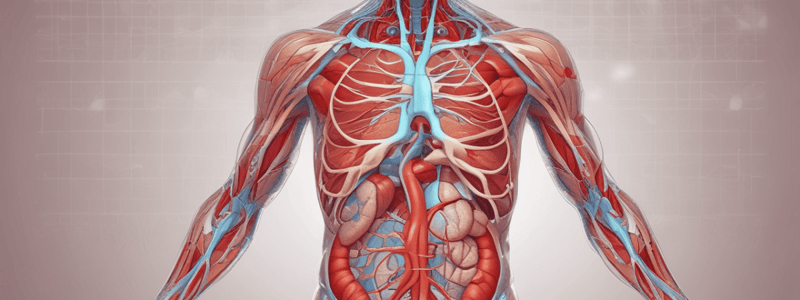Podcast
Questions and Answers
Which of the following organs has the highest arteriovenous O2 difference under normal resting conditions?
Which of the following organs has the highest arteriovenous O2 difference under normal resting conditions?
- Brain
- Kidney
- Heart (correct)
- Skeletal muscle
In which phase of the ventricular muscle action potential is the sodium permeability the highest?
In which phase of the ventricular muscle action potential is the sodium permeability the highest?
- Phase 3
- Phase 0 (correct)
- Phase 2
- Phase 1
Which condition at the A-V node will cause a decrease in heart rate?
Which condition at the A-V node will cause a decrease in heart rate?
- Decreased acetylcholine levels
- Increased sodium permeability
- Increased potassium permeability (correct)
- Increased norepinephrine levels
The 'T wave' is due to which of the following electrical events within the heart?
The 'T wave' is due to which of the following electrical events within the heart?
Frank-Starling's law of the heart explains which of the following?
Frank-Starling's law of the heart explains which of the following?
Anaemia caused by vitamin B12 and folate deficiency is characterized as which type of anaemia?
Anaemia caused by vitamin B12 and folate deficiency is characterized as which type of anaemia?
The serum component is characterized by which of the following?
The serum component is characterized by which of the following?
The most abundant and buffering capacity buffer system in plasma is which of the following?
The most abundant and buffering capacity buffer system in plasma is which of the following?
Which blood group system can safely receive Rh-negative blood?
Which blood group system can safely receive Rh-negative blood?
What is the significant physiological event indicated by the 'T wave' in an electrocardiogram?
What is the significant physiological event indicated by the 'T wave' in an electrocardiogram?
What primarily characterizes the serum component of blood?
What primarily characterizes the serum component of blood?
Which buffer system has the greatest buffering capacity in plasma?
Which buffer system has the greatest buffering capacity in plasma?
Which of the following statements about blood transfusion is correct?
Which of the following statements about blood transfusion is correct?
Which type of anemia is caused by vitamin B12 and folate deficiency?
Which type of anemia is caused by vitamin B12 and folate deficiency?
Study Notes
Organ Function and Oxygen Difference
- The organ with the highest arteriovenous O2 difference under normal resting conditions is the heart.
Ventricular Muscle Action Potential
- The sodium permeability is the highest in phase 0 of the ventricular muscle action potential.
A-V Node and Heart Rate Regulation
- An increase in potassium permeability at the A-V node will cause a decrease in heart rate.
ECG and Heart Activity
- The "T wave" is due to ventricular repolarization within the heart.
Frank-Starling's Law of the Heart
- Frank-Starling's law of the heart explains the increase in cardiac output that occurs when venous return is increased.
Anemia Types
- Anemia caused by vitamin B12 and folate deficiency is megaloblastic anemia.
Blood Components and Plasma
- Serum is characterized by plasma with fibrinogen and some clotting factors removed.
- Plasma is whole blood with haemocytes removed.
Buffer Systems in Plasma
- The most abundant and buffering capacity buffer system in plasma is Bicarbonate buffer system (NaHCO3/H2CO3).
Cardiac Conduction and Action Potential
- The fastest rate of conduction of the cardiac action potential occurs in Purkinje fibers.
Organ Oxygen Demand
- Skeletal muscle has the highest arteriovenous O2 difference under normal resting conditions.
Ventricular Muscle Action Potential
- Sodium permeability is highest in phase 4 of the ventricular muscle action potential.
Heart Rate Regulation
- Decreased acetylcholine levels at the A-V node will cause an increase in heart rate.
ECG Waveforms
- The T wave is due to ventricular repolarization.
Cardiac Function
- Frank-Starling's law of the heart explains the increase in cardiac output when the ventricular end-diastolic volume increases, not when the sympathetic nerves supplying the heart are stimulated.
Anemia
- Vitamin B12 and folate deficiency causes megaloblastic anemia.
Blood Components
- Serum is characterized by plasma with fibrinogen and some clotting factors removed.
Blood Buffering Systems
- The KHCO3/H2CO3 buffer system has the highest buffering capacity in plasma.
Blood Transfusion
- ABO blood group system cannot be transfused without cross-matching.
- A person with blood group O is not always a "universal blood donor".
- A person with blood group AB is not always a "universal recipient".
- Rh-positive people should not receive Rh-negative blood.
Studying That Suits You
Use AI to generate personalized quizzes and flashcards to suit your learning preferences.
Description
Test your knowledge of human physiology with these questions about heart and muscle function, including arteriovenous O2 differences and ventricular muscle action potentials.




